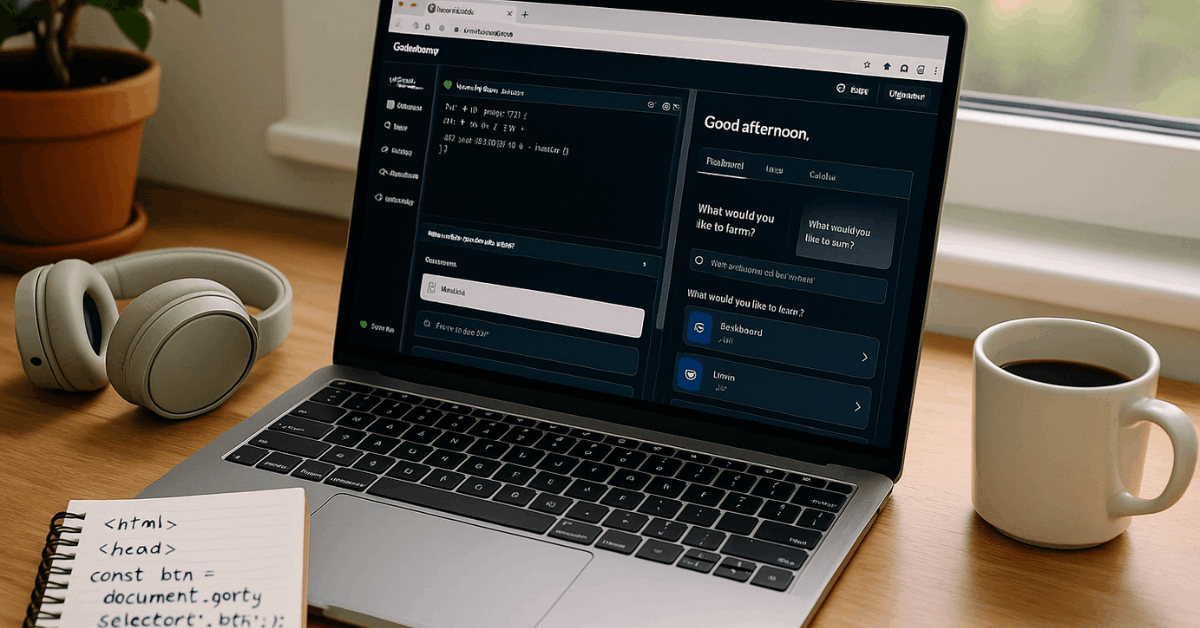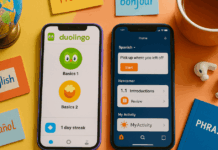Learning to code no longer demands deep pockets or university enrollment.
A new wave of free, high-quality bootcamps now equips aspiring developers worldwide with practical skills, mentorship, and job-ready portfolios.
This guide will help you identify the platform that best suits you for learning coding for free.
What a Free Coding Bootcamp Delivers
A bootcamp compresses core programming concepts into an accelerated, project-driven package, giving you structured guidance without tuition fees. Expect immersive sessions, peer interaction, and industry tools that mirror real workplace scenarios.
- Intensive schedule or self-paced track – Cohorts may follow daily live classes, while self-guided versions let you move through modules whenever time allows.
- Hands-on curriculum – Projects, code reviews, and quizzes reinforce each lesson, ensuring you solve real problems rather than memorize theory.
- Career resources – Many providers include interview coaching, résumé feedback, and networking events to help you transition into paid roles.
Why Certain Bootcamps Stay Free
Sponsors, corporate grants, and government skills initiatives often cover operating costs, enabling tuition-free access.
Some schools use income-share agreements where graduates repay a percentage of their salary only after securing qualifying employment. Always confirm the payment policy so hidden obligations never catch you off guard.
Core Skills You Gain
A concise overview prepares you for the tasks common to entry-level developer roles.
- Frontend building blocks – HTML structures content, CSS controls presentation, and JavaScript adds dynamic behavior.
- Backend foundations – Languages such as Python, Java, or PHP handle server logic, while frameworks like Node.js or Ruby on Rails streamline workflows.
- Version control fluency – Git commands and GitHub collaboration keep code history organized and team communication transparent.
- Debugging and problem-solving – Systematic tactics help identify, isolate, and fix defects quickly.
- Soft competencies – Teamwork, time management, and clear communication enable productive collaboration in distributed environments.
Why Bootcamps?
A brief preview highlights why thousands choose the no-cost route.
- Zero financial risk – You explore coding without incurring debt, which is useful if you are still testing career interest.
- Accelerated learning path – Focused curricula let you move from beginner to portfolio-ready faster than casual self-study.
- Project portfolio – Completed apps showcase applied knowledge to recruiters and hiring managers.
- Global peer network – Slack groups, forums, and alumni events connect you with mentors and job leads worldwide.
Top Free Coding Bootcamps in 2025
Each program below earned strong reviews for curriculum quality, community support, and graduate outcomes. Admission policies vary, so verify availability in your region; most operate online for worldwide access.
1 | CareerFoundry — Web Development for Beginners Course
Five project-driven days guide you through HTML, CSS, JavaScript, and responsive design while you build a personal website. Optional mentored tracks lead into a full-stack paid path with a job guarantee.
2 | Codecademy Free Tracks
Interactive in-browser exercises emphasize “learn by doing.” Start with HTML and Ruby, then progress to JavaScript, React, Node.js, and game development. Upgrade to the Pro plan later for career paths and quizzes.
3 | CodeOp Foundations
Live online workshops teach HTML, CSS, JavaScript, Git, and command-line basics to women and gender-expansive learners. Small cohorts foster mentorship and confidence.
4 | UpSkill Essential Web Developer Course
A 197-lesson, self-paced program covers HTML, CSS, JavaScript, Ruby, and practical tooling without overwhelming jargon. The JavaScript Basics bootcamp offers another entry point.
5 | Ada Developers Academy
Seattle-based yet globally accessible online, this nonprofit focuses on Python, JavaScript, HTML, SQL, and advocacy training for underrepresented genders. Emphasis on debugging and communication prepares graduates for teamwork.
6 | freeCodeCamp Certifications
Modular tracks—Responsive Web Design, APIs and Microservices, Frontend Libraries, Machine Learning—culminate in real projects and verified certificates. Thousands of coding challenges sharpen interview readiness.
7 | Skillcrush Free Coding Bootcamp
Alongside HTML and CSS, the curriculum introduces WordPress theme development and entry-level UX design, ideal for freelancers who want ongoing demand.
8 | MIT OpenCourseware – Introduction to Computer Science Using Python
Recorded lectures and graded problem sets teach computational thinking with Python 3.5. Academic depth builds a strong algorithmic mindset for software roles worldwide.
9 | Resilient Coders
A twenty-week online cohort trains young people of color in HTML, CSS, and JavaScript, plus client freelance projects that simulate real contracts.
10 | Founders and Coders Skills Bootcamp
A three-month part-time schedule covers accessible web design, modern JavaScript, testing, and interview prep. Discord-based collaboration replicates professional remote workflows.
11 | Flatiron School Free Prep Courses
Video-led units break down HTML & CSS, JavaScript, Ruby, and API integration. Graduates can continue into comprehensive, paid software engineering tracks.

Paid Bootcamps for Deeper Mastery
Sometimes, a structured, mentor-driven environment with guaranteed support justifies tuition. The programs below represent popular routes once free resources spark further ambition.
| Bootcamp | Duration | Cost | Stand-out Feature |
| CareerFoundry Full-Stack Program | 16–28 weeks | US $ 8,075–8,500 | Dedicated tutor–mentor pairing plus job guarantee |
| Fullstack Academy Online | 17–28 weeks | US $ 19,910 | Four portfolio projects built with pair programming |
| Flatiron School Software Engineering | 15–60 weeks | US $ 17,900 | Live online lectures mirroring campus experience |
| Wild Code School Web Developer | 12 weeks | € 6,000 | French and English cohorts with employability coaching |
| Coding Dojo Full-Time Online | 14 weeks | US $ 16,995 | Three complete stacks: Python, MERN, Java |
| WBS Coding School Web & App | 15–24 weeks | € 9,000–10,500 | Hybrid Berlin residency option plus career support |
| General Assembly Software Engineering | 12–24 weeks | US $ 16,450 | Remote instruction via Zoom and Slack, global alumni |
How to Choose the Right Free Bootcamp
A concise checklist helps you match a program to personal objectives and learning style.
Language Alignment
Clarify your career goals—frontend, backend, or full-stack—then prioritize bootcamps that teach relevant languages. Python and JavaScript remain versatile for beginners.
Learning Format
Assess whether live cohorts or self-paced modules suit your schedule and motivation. Interactive labs often aid retention, particularly for those who prefer practical tasks over lengthy video lectures.
Curriculum Breadth
Look beyond syntax drills. Favor bootcamps that incorporate version control, API integration, and agile workflows, replicating day-to-day developer responsibilities.
Support Mechanisms
Forums, mentor hours, or peer code reviews significantly increase success rates when tackling complex topics. Verify active community channels before committing.
Currency of Material
Programming ecosystems evolve quickly. Choose courses updated within the past one to two years so frameworks and tooling match current industry standards.
Next Steps After Graduation
Completing a free bootcamp marks only the midpoint. Continue sharpening competence through side projects, open-source contributions, and algorithm practice. Build a cohesive portfolio, refine your résumé with concrete project metrics, and leverage alumni networks for interview referrals.
Frequently Asked Questions
You might ask the following questions:
- What distinguishes a free bootcamp from a paid track?
Paid programs typically include extended curricula, one-on-one mentorship, and guaranteed career support, whereas free versions focus on essential skills and community forums. - Is investing in a paid program worthwhile?
Return on investment depends on career intent. When aiming for a full-scale transition, structured mentorship, accredited projects, and placement assistance accelerate job entry. - Do major tech firms hire bootcamp graduates?
Yes. Industry reports place Amazon, Google, and global financial institutions high on the list of employers recruiting bootcamp alumni. - What happens during a typical bootcamp day?
Expect coding challenges, live seminars, pair programming, and project sprints; the exact balance shifts by provider and track intensity. - Does age limit bootcamp success?
Statistics show substantial participation from learners aged 35-44, proving career shifts into development remain viable at any stage.
Conclusion
Free coding bootcamps deliver structured, hands-on paths into development careers without upfront costs.
Evaluate language focus, teaching format, and support depth to find the ideal fit, then commit to daily practice. Your coding journey starts now—worldwide access removes barriers, leaving only consistent effort between you and job-ready proficiency.





